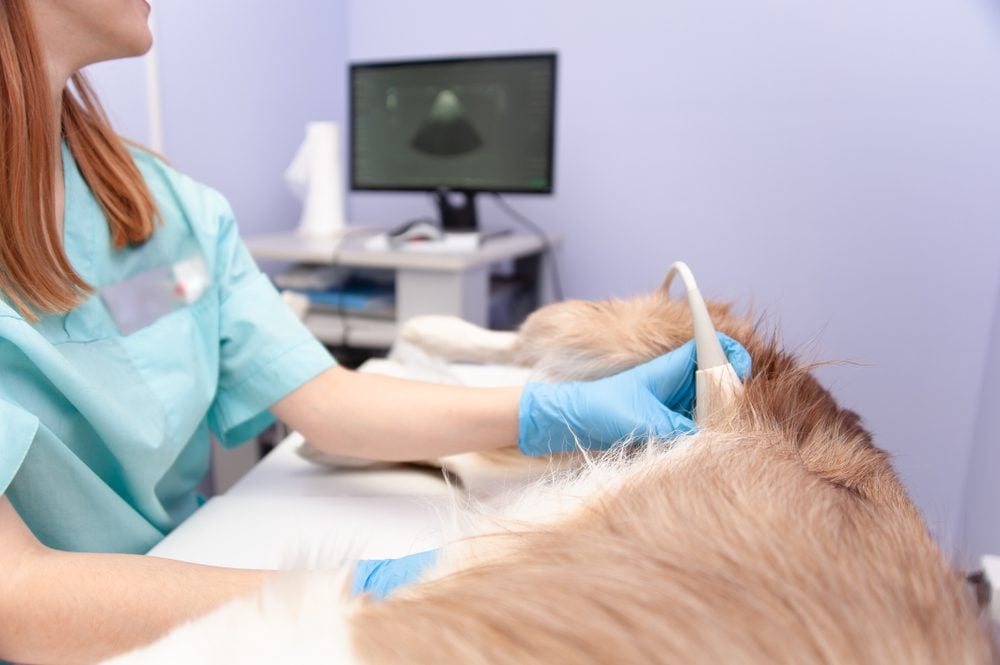Dog Abortion: Ethics, Methods, Costs and More

Table of Contents
Can You Terminate a Dog’s Pregnancy?

Yes, it is possible to terminate a dog’s pregnancy. There are different dog abortion options for pregnant dogs. Based on their nature, dog abortion methods are classified as surgical and medical.
However, before you decide to terminate the dog’s pregnancy, it is advisable to consult with your vet on the procedure – its risks and ethical aspects. The vet will help you make the best and most informed decision.
Why Would a Dog Need an Abortion?
There are several reasons why a dog might need an abortion – some concern the dog’s health, and others are ethical.
Here are the reasons canine pregnancy should be ended:
- Unwanted Mating. Mismating results in unwanted pregnancies and puppies the owner is not ready to care for. In such cases, the puppies may end up in the streets or shelters. To avoid this scenario, a dog owner may decide on an abortion.
- Risky Pregnancy. If a female dog has a chronic condition that makes pregnancy risky, it is best to consider dog abortion. Spontaneous abortion is more dangerous than abortion in proper medical settings.
- Possible Complications. If the female dog suffers from an issue that carrying a litter of puppies may worsen, pregnancy termination is advised. This may include dogs with a broken leg, hip dysplasia, or severe malnourishment.
- Hereditary Conditions. Some dogs have conditions and diseases that can be passed on to their offspring. This is why responsible breeders exclude ill dogs from mating plans. But in the case of accidental mating, an abortion might be the best option.
However, unwanted mating is the most common cause pet owners seek dog abortion. Male dogs are naturally attracted to females in heat, and even if the pet parents are careful, there is a high risk of mismating.
How is a Dog Abortion Done?

There are two main methods for termination of pregnancy in dogs – surgical and medical.
Surgical Dog Abortion. The surgical method is permanent as it involves ovariohysterectomy, or in simple words, spaying the dog while pregnant.
The procedure is more complicated than the routine spay – the dog’s ovaries are more fragile, and the uterus’ blood vessels larger. Also, for some veterinarians, this is not ethical for dogs in late pregnancy with already well-developed fetuses.
Medical Dog Abortion. The medical methods are based on the use of abortifacients or meds that can disrupt the gestation process and trigger dog abortion. There are several protocols that can be used:
- Prostaglandin and Prolactin Inhibitors. This combination is the golden standard for dog abortion. Veterinarians use prostaglandin F2 alpha and cabergoline or bromocriptine (the first one is better but more expensive). The protocol is considered to be effective and at the moment among the safer options.
- Antiprogestogens. Another safe and effective option is aglepristone – a synthetic drug that counteracts the effects of progesterone. Aglepristone comes as an injection, under the brand name Alizin. Depending on the dog’s size, Alizin can be a costly solution, but it is mess-free (no vaginal discharge) and has a low risk of side effects.
- Dexamethasone. Dexamethasone is a corticosteroid that in high doses causes abortion. This is generally considered to be a side effect of the drug but in this case, it can be used as a benefit. To trigger dog abortion, dexamethasone needs to be used for nine to 12 days and it often causes complications.
- The Mismating Shot. In the past, vets used an estrogen injection to induce dog abortion on the first days following the mating. Today, the injection is deemed dangerous and is no longer used as it comes with severe side effects. There are also oral estrogens but they are just as dangerous as the shot.
Is There a Plan B for Dogs?
No, there is no approved plan B for dogs. Pet owners must never give their dogs “morning-after“ pills formulated for humans.
There is insufficient medical research to understand the risks and side effects of these drugs on the canine reproductive systems. Using human plan B options in dogs can result in toxicity and in severe cases have a fatal outcome.
What are the Side Effects of a Dog Abortion?
The side effects of dog abortion can vary from increased thirst to bone marrow suppression. What to expect depends on the used abortion method.
For example, prostaglandin F2 alpha may cause nausea, dog diarrhea, tremors, and agitation. In more severe cases, it may result in anorexia, mammary congestion, and severe blood loss. Prolactin inhibitors, especially bromocriptine, cause dog vomiting.
Dexamethasone comes with a longer list of possible side effects, including excessive thirst, polyuria (increased urination frequency), pyometra (uterine infection), suppressed immune system, and medically induced Cushing’s disease.
In cases of ovariohysterectomy, there are several side effects associated with anesthesia and surgical site (infection, broken sutures, etc.).
Is it Dangerous for a Dog to Get an Abortion?
While there are certain risks associated with dog abortion, Pet MD states there are ways to perform a safe pregnancy termination.
Generally speaking, the risks and side effects are reduced to a minimum when the abortion is performed by a licensed veterinarian in proper veterinary settings.
Prior to performing a dog abortion, the vet will explain the possible dangers of the procedure. Based on individual factors, they will also recommend the best abortion option.
What is the Recovery of Abortion in Dogs?

According to Hospital Veterinari Glories, dogs need lots of extra attention while recovering from an abortion. Following an abortion female dogs require rest, high-quality pet care, and tons of love.
Some dogs may exhibit signs of lethargy and depression, but these are transient and resolve on their own. Also, based on the abortion method used, the dog may have vaginal discharge.
In cases of surgical dog abortion, the dog might need to wear an Elizabethan collar to avoid messing with the stitches. Limited physical activity will also be advised.
Can I Terminate My Dog’s Pregnancy at Home?
No, you must not terminate your dog’s pregnancy at home. Animal Wised states that a dog abortion cannot be done at home under any circumstances.
Dog abortion is a complex procedure and must be done by a licensed doctor of veterinary medicine (DVM). First, the vet will determine the dog’s pregnancy (using a blood test that measures levels of the hormone relaxin or with an abdominal ultrasound).
Then, the veterinarian will explain the dog abortion options. Each option has potential risks and the vet will carefully monitor the dog to reduce them and intervene if necessary.
Considering the number of things that can go wrong during an abortion and the severity of the risks, pet owners must never attempt to perform a dog abortion at home.
How Much Does a Dog Abortion Cost?
In the case of accidental mating within the first 15 days of her heat cycle, the costs of dog abortion are between $45 and $175. Drug-induced methods are around $100-$700.
When terminating a late pregnancy, using a surgical method, the abortion may cost $2.000 or even $3.000. This also includes the expenses for hospitalization following the surgery.
According to AnimalSo, factors affecting the cost of the abortion are the dog’s size, how far along the pregnancy is, and where you live.
Is Dog Abortion Legal?

Yes, dog abortion is legal in most states. The veterinary practice will guide you through the process of termination of pregnancy and help you decide on the best option. However, it is for the individual veterinarian to decide the ethical viewpoint and sometimes even refuse to terminate pregnancy.
















